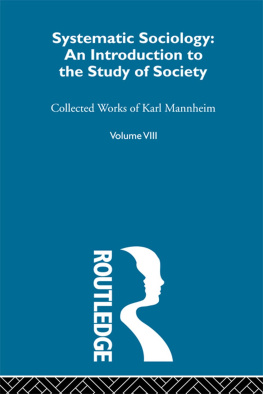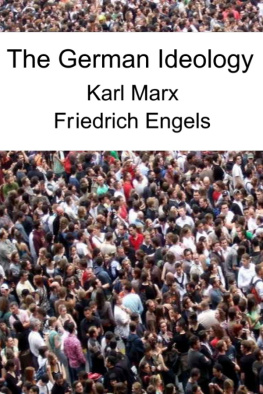Karl Mannheim - Ideology and Utopia
Here you can read online Karl Mannheim - Ideology and Utopia full text of the book (entire story) in english for free. Download pdf and epub, get meaning, cover and reviews about this ebook. year: 2020, publisher: Barakaldo Books, genre: Science. Description of the work, (preface) as well as reviews are available. Best literature library LitArk.com created for fans of good reading and offers a wide selection of genres:
Romance novel
Science fiction
Adventure
Detective
Science
History
Home and family
Prose
Art
Politics
Computer
Non-fiction
Religion
Business
Children
Humor
Choose a favorite category and find really read worthwhile books. Enjoy immersion in the world of imagination, feel the emotions of the characters or learn something new for yourself, make an fascinating discovery.
- Book:Ideology and Utopia
- Author:
- Publisher:Barakaldo Books
- Genre:
- Year:2020
- Rating:4 / 5
- Favourites:Add to favourites
- Your mark:
- 80
- 1
- 2
- 3
- 4
- 5
Ideology and Utopia: summary, description and annotation
We offer to read an annotation, description, summary or preface (depends on what the author of the book "Ideology and Utopia" wrote himself). If you haven't found the necessary information about the book — write in the comments, we will try to find it.
Ideology and Utopia — read online for free the complete book (whole text) full work
Below is the text of the book, divided by pages. System saving the place of the last page read, allows you to conveniently read the book "Ideology and Utopia" online for free, without having to search again every time where you left off. Put a bookmark, and you can go to the page where you finished reading at any time.
Font size:
Interval:
Bookmark:


Barakaldo Books 2020, all rights reserved. No part of this publication may be reproduced, stored in a retrieval system or transmitted by any means, electrical, mechanical or otherwise without the written permission of the copyright holder.
Publishers Note
Although in most cases we have retained the Authors original spelling and grammar to authentically reproduce the work of the Author and the original intent of such material, some additional notes and clarifications have been added for the modern readers benefit.
We have also made every effort to include all maps and illustrations of the original edition the limitations of formatting do not allow of including larger maps, we will upload as many of these maps as possible.
Ideology and Utopia
An Introduction to the Sociology of Knowledge
By
KARL MANNHEIM
The London School of Economics and Political Science (University of London)
Formerly Professor of Sociology in the University of Frankfurt/Main
With a Preface by LOUIS WIRTH
Associate Professor in the University of Chicago
DEDICATION
To
JULIA MANNHEIM-LANG
TABLE OF CONTENTS
Contents
THE present volume combines a number of different writings of the author. Parts IIIV represent Professor Mannheims Ideologie und Utopie (F. Cohen, Bonn, Schulte-Bulmke, Frankfurt-am-Main); Part V consists of his article Wissenssoziologie, originally published in Alfred Vierkandts Handwrterbuch der Soziologie (F. Enke, Stuttgart, 1931). Part I was especially written to introduce the present volume to the Anglo-Saxon reader.
Whereas Parts IIIV deal with the central problems of the sociology of knowledge and exemplify the method of this emerging discipline as applied to some of the most significant phases of recent and contemporary social life, the last part seeks to formulate a concise prospectus of this new scientific interest.
Stylistically the first four parts of this book will be found to differ markedly from the last. Whereas the former develop their respective themes rather fully, the latter, being originally an article for an Encyclopdia, is scarcely more than a schematic outline.
A classified bibliography is appended containing all of the works cited by Professor Mannheim in the above-mentioned article. To these items have been added some of the more significant representative contributions of American, English, French, and German thought on this subject which appeared to the translators to be relevant and suggestive.
Despite the involved language of the original, the translators have thought it worthwhile to adhere as closely as possible to the German text. While certain modifications have at times seemed necessary for the sake of intelligibility, strenuous efforts have been made to convey the authors meaning accurately.
Thanks are due to Professor Robert Cooley Angell, of the University of Michigan, for reading sections of Parts II and V, and to Mr. Arthur Bergholz, of the University of Chicago, who read sections 19 of Ideology and Utopia. Thanks are also tendered to Mrs. E. Ginsberg (M.A., Oxon), and Miss Jean McDonald (B.Sc. (Econ.), Lond.), for their help and valuable suggestions concerning the editing of the translation. The Social Science Research Committee of the University of Chicago generously provided assistance in typing the manuscript.
LOUIS WIRTH.
EDWARD A. SHILS.
BY LOUIS WIRTH
THE original German edition of Ideology and Utopia appeared in an atmosphere of acute intellectual tension marked by widespread discussion which subsided only with the exile or enforced silence of those thinkers who sought an honest and tenable solution to the problems raised. Since then the conflicts which in Germany led to the destruction of the liberal Weimar Republic have been felt in various countries all over the world, especially in Western Europe and the United States. The intellectual problems which at one time were considered the peculiar preoccupation of German writers have enveloped virtually the whole world. What was once regarded as the esoteric concern of a few intellectuals in a single country has become the common plight of the modern man.
In response to this situation there has arisen an extensive literature which speaks of the end, the decline, the crisis, the decay, or the death of Western civilization. But despite the alarm which is heralded in such titles, one looks in vain in most of this literature for an analysis of the basic factors and processes underlying our social and intellectual chaos. In contrast with these Professor Mannheims work stands out as a sober, critical, and scholarly analysis of the social currents and situations of our time as they bear upon thought, belief, and action.
It seems to be characteristic of our period that norms and truths which were once believed to be absolute, universal, and eternal, or which were accepted with blissful unawareness of their implications, are being questioned. In the light of modern thought and investigation much of what was once taken for granted is declared to be in need of demonstration and proof. The criteria of proof themselves have become subjects of dispute. We are witnessing not only a general distrust of the validity of ideas but of the motives of those who assert them. This situation is aggravated by a war of each against all in the intellectual arena where personal self-aggrandizement rather than truth has come to be the coveted prize. Increased secularization of life, sharpened social antagonisms and the accentuation of the spirit of personal competition have permeated regions which were once thought to be wholly under the reign of the disinterested and objective search for truth.
However disquieting this change may appear to be, it has had its wholesome influences as well. Among these might be mentioned the tendency toward a more thoroughgoing self-scrutiny and toward a more comprehensive awareness of the interconnections between ideas and situations than had hitherto been suspected. Although it may seem like grim humour to speak of the beneficent influences arising out of an upheaval that has shaken the foundations of our social and intellectual order, it must be asserted that the spectacle of change and confusion, which confronts social science, presents it at the same time with unprecedented opportunities for fruitful new development. This new development, however, depends on taking full cognizance of the obstacles which beset social thought. This does not imply that self-clarification is the only condition for the further advancement of social science, as will be indicated in what follows, but merely that it is a necessary pre-condition for further development.
The progress of social knowledge is impeded if not paralysed at present by two fundamental factors, one impinging upon knowledge from without, the other operating within the world of science itself. On the one hand the powers that have blocked and retarded the advance of knowledge in the past still are not convinced that the advance of social knowledge is compatible with what they regard as their interests, and, on the other hand, the attempt to carry over the tradition and the whole apparatus of scientific work from the physical to the social realm has often resulted in confusion, misunderstanding, and sterility. Scientific thought about social affairs up to now has had to wage war primarily against established intolerance and institutionalized suppression. It has been struggling to establish itself against its external enemies, the authoritarian interest of church, state, and tribe. In the course of the last few centuries, however, what amounts at least to a partial victory against these outside forces has been won, resulting in a measure of toleration of untrammelled inquiry, and even encouragement of free thought. For a brief interlude between the eras of medieval, spiritualized darkness and the rise of modern, secular dictatorships, the Western world gave promise of fulfilling the hope of the enlightened minds of all ages that by the full exercise of intelligence men might triumph over the adversities of nature and the perversities of culture. As so often in the past, however, this hope seems now to be chastened. Whole nations have officially and proudly given themselves up to the cult of irrationality, and even the Anglo-Saxon world which was for so long the haven of freedom and reason has recently provided revivals of intellectual witch hunts.
Next pageFont size:
Interval:
Bookmark:
Similar books «Ideology and Utopia»
Look at similar books to Ideology and Utopia. We have selected literature similar in name and meaning in the hope of providing readers with more options to find new, interesting, not yet read works.
Discussion, reviews of the book Ideology and Utopia and just readers' own opinions. Leave your comments, write what you think about the work, its meaning or the main characters. Specify what exactly you liked and what you didn't like, and why you think so.





